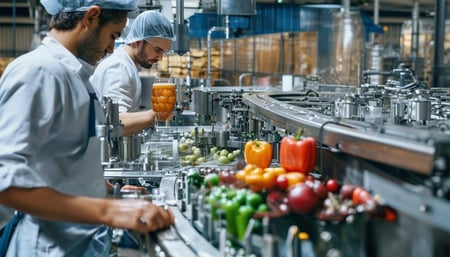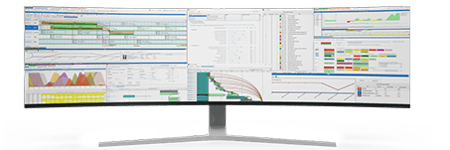Circular Supply Chain Investments
In recent years, the food and beverage manufacturing sector has faced increasing pressure to reduce environmental impact, minimize waste, and embrace sustainable practices. The circular economy, with its focus on extending product life cycles, reducing waste, and reusing resources, presents a viable solution to these challenges. For supply chain managers, this shift is not just a trend but a necessity to stay competitive and meet regulatory and consumer expectations.
Circular supply chain investments are now at the forefront of strategic initiatives, and the integration of advanced planning and scheduling tools like PlanetTogether with platforms like SAP, Oracle, Microsoft, Kinaxis, or Aveva can significantly enhance these efforts.
In this blog, we’ll explore the importance of circular supply chains in the food and beverage sector, highlight key investment areas, and discuss how the integration of PlanetTogether with leading enterprise systems can accelerate the transition to a more sustainable supply chain.

The Importance of Circular Supply Chains in Food and Beverage Manufacturing
The traditional linear supply chain model—produce, consume, and dispose—is no longer viable in an era where environmental sustainability is a top priority. Circular supply chains aim to close the loop by keeping resources in use for as long as possible, extracting maximum value from products, and regenerating natural systems. For food and beverage manufacturers, this means reducing food waste, recycling packaging materials, and optimizing the use of raw materials throughout the production cycle.
Key benefits of a circular supply chain include:
Reduction in waste and emissions: Circular strategies help minimize waste production, whether it's food waste or packaging, and significantly cut down on carbon emissions.
Cost savings: Reusing materials and optimizing resource use can lead to substantial cost reductions, particularly in raw material procurement and waste disposal.
Improved brand reputation: As consumers become more environmentally conscious, companies with strong sustainability commitments are more likely to win customer loyalty.
Regulatory compliance: Governments worldwide are tightening regulations around waste and environmental impact. A circular approach helps manufacturers stay ahead of these regulations.

Key Investment Areas for a Circular Supply Chain
To build a circular supply chain in the food and beverage industry, several key investment areas must be considered. These areas focus on reducing waste, maximizing resource efficiency, and integrating innovative technologies to support sustainability goals.
Sustainable Packaging
One of the most significant waste contributors in the food and beverage industry is packaging. Investing in sustainable packaging solutions—such as biodegradable, compostable, or recyclable materials—can significantly reduce environmental impact. Manufacturers are also looking at ways to design packaging that can be reused or returned, further enhancing the circularity of the supply chain.
Food Waste Reduction
Food waste is a critical issue in the industry, with large quantities of produce lost at various stages of the supply chain. By investing in advanced analytics and better planning tools, manufacturers can improve forecasting, reduce overproduction, and ensure that raw materials are used efficiently. Waste generated during production can also be repurposed, such as using food by-products for animal feed or bioenergy generation.
Reverse Logistics
In a circular supply chain, reverse logistics plays a vital role. This involves managing the return of goods, whether for recycling, reuse, or disposal. For example, a beverage company might introduce a take-back program for used bottles and cans, which are then processed and reused in the production cycle. Investing in reverse logistics systems ensures that the flow of returned goods is efficiently managed, reducing waste and creating new value streams.
Resource Efficiency
Investing in technologies and processes that improve resource efficiency is crucial to supporting a circular supply chain. This includes optimizing energy use, reducing water consumption, and minimizing raw material inputs. Technologies such as IoT (Internet of Things) sensors can provide real-time data on energy and water use, helping manufacturers to identify inefficiencies and make data-driven decisions to improve sustainability.
Digital Supply Chain Platforms
Circular supply chain initiatives require advanced digital tools that can provide visibility, track sustainability metrics, and optimize decision-making. PlanetTogether’s advanced planning and scheduling (APS) system, when integrated with ERP platforms like SAP, Oracle, Microsoft, Kinaxis, or Aveva, provides the necessary data and insights to drive circular strategies across the supply chain. This integration enables manufacturers to make better decisions on resource use, production scheduling, and waste reduction, ensuring a more sustainable and efficient supply chain.
![]()

How PlanetTogether Integration Enhances Circular Supply Chain Investments
Advanced planning and scheduling tools are essential for optimizing supply chain operations in a circular economy. PlanetTogether’s APS system offers a range of features that can significantly improve the efficiency and sustainability of supply chain processes. When integrated with leading enterprise systems like SAP, Oracle, Microsoft, Kinaxis, or Aveva, it provides even greater value by enhancing data visibility, improving coordination, and enabling seamless execution of circular supply chain initiatives.
Real-Time Visibility Across the Supply Chain
Integration between PlanetTogether and ERP systems such as SAP or Oracle provides real-time visibility across the entire supply chain. This visibility is critical for tracking material flows, monitoring resource use, and identifying potential inefficiencies. Supply chain managers can see where waste is being generated, identify bottlenecks, and take corrective action before problems escalate. This level of insight is essential for supporting circular strategies, such as reducing overproduction or minimizing energy use.
Improved Resource Planning and Utilization
PlanetTogether’s APS system helps optimize resource planning, ensuring that raw materials, energy, and labor are used as efficiently as possible. Integration with systems like Microsoft or Kinaxis provides access to detailed production data, allowing manufacturers to fine-tune their operations for maximum resource efficiency. This helps reduce waste, lower energy consumption, and minimize the environmental impact of production processes.
Sustainability Metrics and Reporting
Tracking progress toward sustainability goals is critical for supply chain managers. When PlanetTogether is integrated with systems like Aveva or SAP, it can provide detailed reporting on sustainability metrics such as waste reduction, energy use, and carbon emissions. These insights allow manufacturers to track the success of circular supply chain initiatives, identify areas for improvement, and report on progress to stakeholders, including regulators and customers.
Enhanced Collaboration Across Stakeholders
Circular supply chains require close collaboration between different stakeholders, from suppliers and manufacturers to distributors and customers. Integration between PlanetTogether and ERP systems facilitates better communication and coordination across the supply chain. This is particularly important for managing reverse logistics, where collaboration is required to efficiently handle the return and recycling of goods. With PlanetTogether integrated into the broader enterprise ecosystem, supply chain managers can easily coordinate with stakeholders to ensure that circular strategies are executed effectively.
Support for Innovation and Flexibility
A circular supply chain requires continuous innovation to find new ways to reduce waste, reuse materials, and improve efficiency. PlanetTogether’s APS system, when integrated with platforms like SAP or Microsoft, supports this innovation by providing the flexibility to adapt to new processes, materials, and technologies. Whether a manufacturer is introducing new sustainable packaging, implementing a take-back program, or adopting energy-efficient production methods, PlanetTogether’s integration ensures that the supply chain can adjust to these changes seamlessly.
The transition to a circular supply chain is no longer optional for food and beverage manufacturers; it is essential for long-term success. By investing in key areas such as sustainable packaging, food waste reduction, reverse logistics, and resource efficiency, manufacturers can reduce their environmental impact, save costs, and meet growing consumer demand for sustainable products.
Integrating PlanetTogether with leading ERP platforms like SAP, Oracle, Microsoft, Kinaxis, or Aveva enhances the effectiveness of these investments by providing the tools needed to optimize planning, track sustainability metrics, and collaborate across the supply chain. For supply chain managers, these integrations are a critical component of achieving a truly circular supply chain that drives both sustainability and profitability.
As the food and beverage industry continues to evolve, those who embrace circular supply chain investments and leverage advanced technologies will be well-positioned to lead the way in sustainability and efficiency. The future is circular, and the time to invest is now.
Are you ready to take your manufacturing operations to the next level? Contact us today to learn more about how PlanetTogether can help you achieve your goals and drive success in your industry.
Topics: PlanetTogether Software, Integrating PlanetTogether, Food and Beverage Manufacturing, Real-Time Visibility Across the Supply Chain, Improved Resource Planning and Utilization, Sustainability Metrics and Reporting, Enhanced Collaboration Across Stakeholders, Support for Innovation and Flexibility




















LEAVE A COMMENT